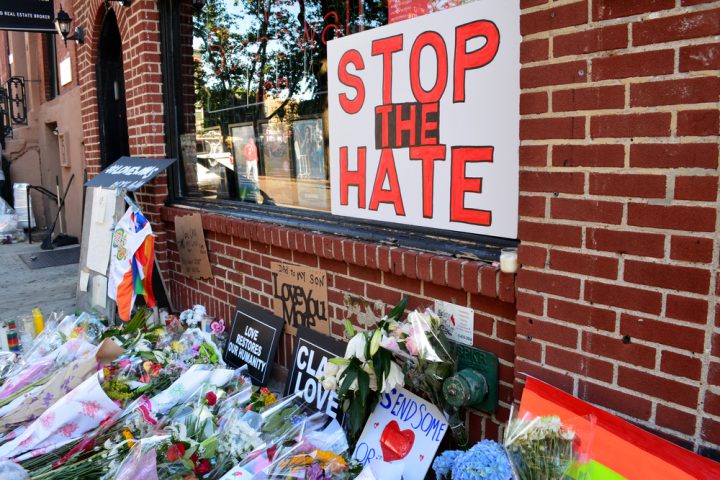Two men threw glass bottles and spewed hateful anti-lesbian slurs at two women who “rejected their advances” in Times Square early Monday morning.
Sources say that the men, Michael Bailey, 23, and Daquan Burns, 24, assaulted the women at approximately 5 a.m. as they walked in the Times Square neighborhood.
New York City prosecutors report that the perpetrators yelled, “They are f*cking dykes”—accompanied by other choice phrases of disgusting anti-LGBT and racist rhetoric—at the victims, who suffered cuts on their hands from the bottles hurled at them. The upstanding gentleman arrested now face charges of felony assault as a hate crime.
This deporable attack occurred less than an hour after an unrelated bias assault in the West Village. According to The New York Daily News, “In that incident, a group of men and women confronted two men, ages 32 and 28, at the corner of 8th Ave. and 14th St […] They derided the men with anti-gay slurs, and one of the men in the group punched the 32-year-old victim in the face.”
These attacks serve as yet another beyond-unsettling reminder that our community still endures bias, discrimination, and the threat of physical harm from those harboring hate in their hearts. Even in a city that generally strives to accept and protect its LGBTQ residents and visitors. Even in neighborhoods (particularly pointing to the West Village assault) that many of us consider “safe havens,” in which we tend to feel that we can finally live, love, and yes, just walk, openly.
In fact, it seems familiarity may ultimately breed contempt, and these celebrated “LGBT safe spots” can often double as well-marked hunting grounds for those with the intentions of targeting (presumed or actual) LGBTQ individuals. FBI research on hate crimes and polled opinions on LGBTQ diversity analyzed by The New York Times in June after the Pulse nightclub massacre suggested that, “Ironically, part of the reason for violence against LGBT people might have to do with a more accepting attitude toward gays and lesbians in recent decades, say people who study hate crimes […] As the majority of society becomes more tolerant of LGBT people, some of those who are opposed to them become more radical, said Mark Potok, a senior fellow at the Southern Poverty Law Center.”
“They may feel that the way they see the world is threatened, which motivates them to strike out in some way, and for some people, that way could be in violent attacks,” Mr. Herek said to The Times.
And for some, obviously, it is. The fact that hate crimes still plague our community isn’t exactly a secret, whether referencing the recent NYC attacks or the heinous tragedy known as “the worst mass shooting in American history” that stole 49 lives at #Pulse in Orlando. The aforementioned Times report found that, “LGBT people are twice as likely to be targeted as African-Americans, and the rate of hate crimes against them has surpassed that of crimes against Jews”—making them the most targeted group for hate crimes in America.
A report by the Bureau of Justice Statistics “found that most crimes are not reported to the police, and those that are reported are frequently not classified as hate crimes by local jurisdictions,” The Times wrote, continuing, “A recent investigation by The Associated Press found that thousands of city police and county sheriff’s departments had not filed a single hate crime report to the F.B.I. between 2009 and 2014.”
The frustration associated with feeling helpless to prevent such crime mounts with each fresh attack, particularly when even police rarely report hate crime attacks properly. The fear of basic physical safety for ourselves and our loved ones remains palpable.
So what can we do? How do we feel safer in a world that—while overall crime has decreased significantly (despite the fact-devoid political spin we often hear asserting otherwise)—we’re the number one target for hate crimes, and they just keep happening?
Perhaps most importantly—in spite of the various understandable reasons traumatized victims or witnesses choose not to speak out, and the underreporting by police themselves—we must try to be diligent in reporting any and all hate-related incidents, and to ensure law enforcement treat them as such. While smaller local jurisdictions may often lack the resources larger police forces like New York’s cultivate to classify and prosecute such crimes and provide help for victims, those of us living in the city do have resources at our disposal for reporting and possibly thwarting anti-LGBTQ hate crimes. The Anti-Violence Project and the New York District Attorney’s Office for Victims or Witnesses of Hate Crimes, for example, both offer excellent online, phone and in-person platforms for getting help, any time of the day or night. It may seem like a Band-Aid on a gaping wound, but it also may be the best way to gradually make sure our issues are taken seriously by law enforcement, and for victims to receive the help they more than deserve.
We at GO wish the victims of both the Times Square and West Village assaults a speedy recovery, but the emotional trauma these incidents incite in victims and the community at large never heals easily. In an era of escalated political and ideological divisiveness, we hope accurate reporting—combined with dialogue and discussion around such attacks and the dangerous mindsets at their roots—foster more understanding, empathy, and the seeking of common ground with those who might otherwise fear our differences. We ultimately believe that #lovewins, but implore NYC law enforcement to prosecute these attacks appropriate to their severity and hateful motives.
Until the glorious day that that we no longer have to “watch our backs” simply because of who we love—stay safe out there.


What Do You Think?